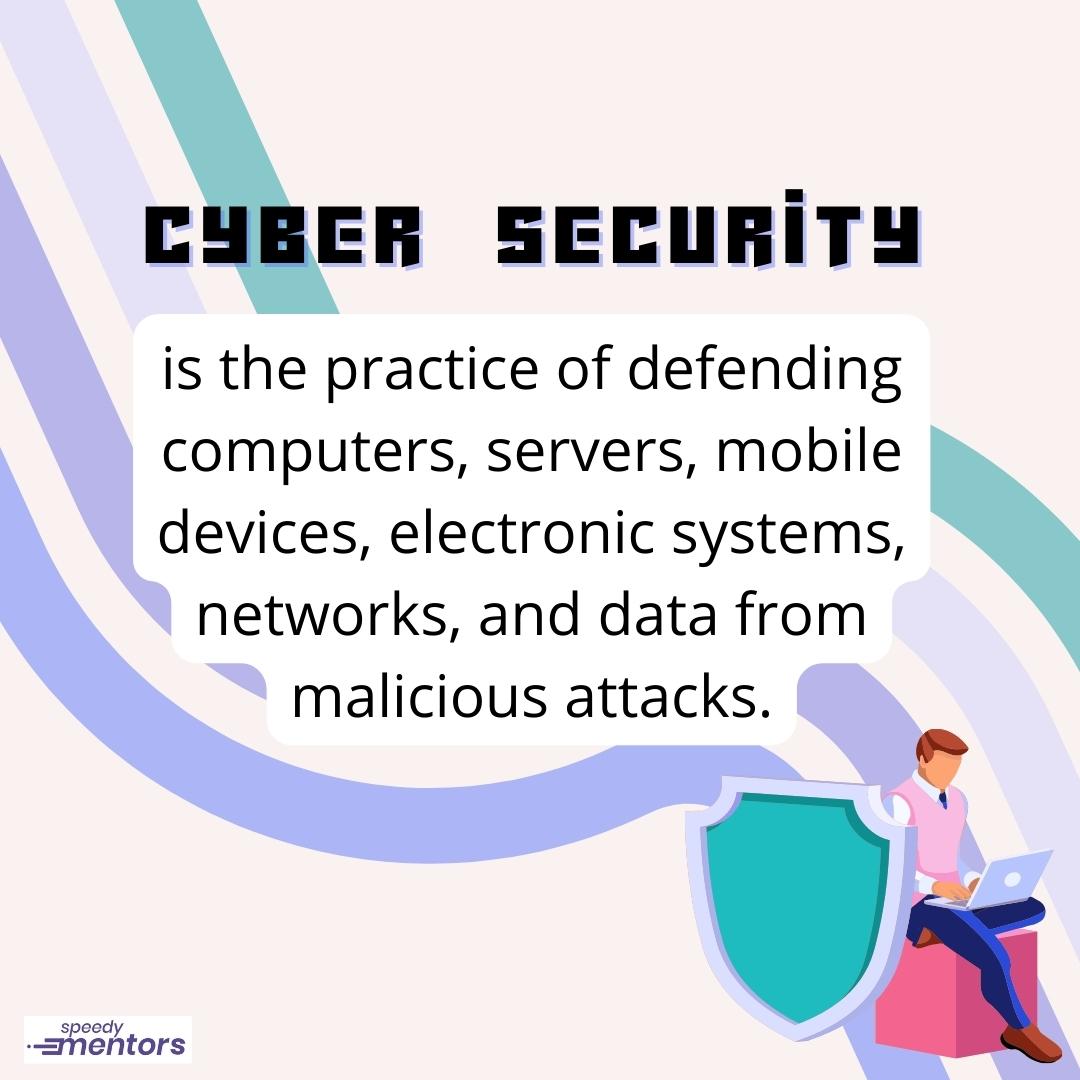.png)
How to Become a Cyber Security Expert
![]() Speedy Mentors
Speedy Mentors
![]() 3 yrs ago
3 yrs ago
Cyber criminals are getting more determined and increasingly becoming resourceful and sophisticated at disrupting computer networks and systems. Due to that, combatting the threats they represent has become a top priority for governments and private enterprises worldwide. Hence, the need for better cyber security measures and more skilled cyber security practitioners has significantly increased in the last decade to protect sensitive data and information. According to a study by the European Cybersecurity Organization, in 2020 alone, the UK government invested roughly $2.30 billion in Internet and network security initiatives for defence and research. Likewise, businesses and governments of major economies like Germany, France, Qatar, India and Canada continue to adopt machine learning, big data, IoT, and cloud in Internet security solutions to learn about and explore potential risks and determine uncertain threats and activities. Those actions are also driving the demand for cyber security experts. Cyberseek.org stated that between 2020 and 2021, there were about 500,000 open positions related to cyber security, and the demand is only likely to increase in the future. With that, there is no better time to enter the field than today. If a role as a cyber security expert sounds like your dream job, read on to find out how you can get into this career path. Cyber security expert is an umbrella term for professionals working in the cyber security industry. Despite differences in job titles and descriptions, all cyber security experts share the same goal: to safeguard data. That data might range from an individual’s financial information, to a company’s clients’ lists and intellectual property, to a government’s classified projects. To protect data from being compromised with respect to integrity, confidentiality, and availability, a cyber security expert may perform a combination of the following functions: Security system development, implementation, analysis, testing, and maintenance Security vulnerability and risk assessment and management Firewall development within network infrastructures Security incident response and reporting Continuous monitoring of attacks and intrusions Threat prevention strategy development Collaborating with authorities when perpetrators are identified Take note that although the above-mentioned duties may be common for majority of cyber security experts, different positions within different companies may also entail different responsibilities. That said, your specific role and responsibilities will largely depend on your experience level and the type of organisation you will be working at. Cyber security is a dynamic global industry that is vital to all other industry types. This should not come as a surprise given that governments and companies of all sizes generate and store sensitive information online to successfully do business in the digital age. As a result, there are multiple job titles that can be pursued to get into the cyber security career path. Some of them are as follows: Computer Forensic Analyst - main task is inspecting cyberattacks to determine the exact methods perpetrators use to gain unauthorised access to a network system. Information Security Analyst - responsible for the development, implementation, monitoring, and adjustment of security policies and strategies and also organising and facilitating security training for employees. Cyber Security Specialist - entry-level job that takes on the duty of monitoring security infrastructure, learning about potential risks, running system checks, and offering suggestions for security improvements. Penetration Tester - also referred to as ethical or white hat hacker. Employed by organisations to breach their systems to understand, expose, and resolve vulnerabilities. Security Architect - in charge of assessing strengths and weaknesses of a company defence systems through the application of techniques hackers might use to gain unauthorised access to protected data. This professional offers recommendations for the software security structures that need to be developed to prevent cyberattacks. Software Security Engineer - responsible for the design and development of detailed security structures, programs, and measures that protect computer systems, networks and information against intrusions. Having an idea of the job titles you can pursue in cyber security will help you identify the qualifications you need to work on to be considered for that role. Although each job role will have specific requirements of their own, many of them also share similar qualifications, which if you meet can significantly improve your job prospects. Below are some of them. Education. Most cyber security jobs demand some form of formal education. There are employers that would accept candidates with associate’s degree in combination with a few years of experience. However, most would prefer employing candidates with a bachelor’s degree in cyber security, programming, computer science, or engineering. If you want to move to a higher position later on in your career, holding a master’s degree might be necessary, as many executive level cyber security jobs require specialist knowledge. Skills. Aside from formal education, the right skill set can also help you start a career in cyber security. Since your job will focus on interacting with software, networks, systems, and cloud, possessing technical aptitude is a must. That includes: A working knowledge of different operating systems, including how they work and are managed. An in-depth understanding of computer networks and cloud computing. The ability to understand network architecture, including how to build, evaluate, and manage it. Ability to code in such programming languages as Python, Java, and C++. Familiarity with network security control, coding practices, threat modeling, and ethical hacking, and security audits. Aside from having technical skills, it is equally important to have soft skills that will influence the way you work and interact with others. Also, many of these soft skills are transferrable, which means you can use them even if you switch to a different career path later on. The soft skills that are highly valued in the cyber security field include, critical thinking, problem-solving, communication, adaptability, curiosity, motivation, passion, and business acumen. Certification. Obtaining professional certifications in cyber security is a great step to prepare for a career in the industry that can also help improve your career prospects. After all, certifications serve as a validation that you have the required knowledge and skills to perform a cyber security role. There are several cyber security certifications available and the ones you should undertake will depend on the stage you are at in your career and the area of cyber security you want to focus on. Here are some certifications you might want to consider: The CompTIA Security+ certification is the most basic certification for cyber security professionals and covers risk management and threat assessment. The Network+ certification by CompTIA is another foundational certification that gives emphasis on networking infrastructure and operations. The Certified Information System Security Professional (CISSP) is worth pursuing if you already have five years of industry experience and would like to advance your knowledge in security engineering, architecture, and management. The Certified Ethical Hacker (CEH) certification is another advanced certification that is recommended if you are an experienced cyber security expert and would like dive deeper in cyberattacks and threat assessment and mitigation. Experience. It is always best to complement your degree and certifications with experience to prove to potential employers your ability to apply your cyber security knowledge and skills in various situations. Having relevant work experience also demonstrates your readiness to take on responsibilities. There are multiple ways for you to build your work experience in cyber security. Perhaps the most common is to have a structured internship or placement with an IT company. This will involve shadowing experienced cyber security professionals and getting assigned tasks that will give you hands-on experience in different cyber security work. Another option is to get into a cyber security bootcamp. This is usually a short yet intensive program designed to develop students’ core skills and work ethic through a combination of lectures and projects. How effective are these bootcamps, you ask? It turns out that they are actually effective for students to jumpstart their careers in a rapidly moving and demanding industry like cyber security. In fact, a recent survey by Indeed involving 1,000 HR managers and technical recruiters in the US found that majority of employers believe that bootcamp graduates are on par with candidates with degrees in terms of being job ready. They also think that they are likely to become high performers with experience and support. If you want a more personal approach to building your cyber security work experience, perhaps working with a cyber security mentor could work for you. Just like bootcamps, there are plenty of platforms online today that can connect you with cyber security mentors who are experts in the field and are ready to help you kickstart your cyber security career. Speedy Mentors, for instance, is a great place to find expert mentors in cyber security. The platform allows you to check the dedicated profile of several mentors and choose one whom you think can best support your needs. The great thing about Speedy Mentors is that the mentors it has onboard are fully vetted, with majority of them working for top companies like Google, IBM, Meta, and Adobe, among others. That gives you the assurance they have in-depth knowledge in different aspects of cyber security and can give you tasks and projects that can contribute to the development of your experience and you can add to your portfolio. Network. Although having professional contacts is not exactly a qualification to become a cyber security expert, it is vital to make your job search productive and move your career forward. The right contacts can give you more than just job leads; some of them can also give you referrals and insider information on hiring companies. Considering those benefits, you should start looking for opportunities to expand your professional network. You can join professional cyber security organisations and groups, attend networking events, or connect with your alumni association. Being smart about your use of social media is another effective route to interact and network with cyber security professionals.Knowing What Cyber Security Experts Do
Common Job Titles Cyber Security Experts Assume
Becoming a Cyber Security Expert
Recent Articles

From Training to Employment as a Data Analyst
In today's data-driven world, ...
![]() Sep 27, 2023
Sep 27, 2023

Software Testing Course Discounts and Offers
In the fast-paced world of sof...
![]() Sep 26, 2023
Sep 26, 2023

Launch Your Data Analyst Career with Online Courses
In today's data-driven world, ...
![]() Sep 25, 2023
Sep 25, 2023

Certification Paths in Project Management
In today's competitive job mar...
![]() Sep 22, 2023
Sep 22, 2023

Placements and Job Assistance in Data Analyst Training
In today's data-driven world, ...
![]() Sep 21, 2023
Sep 21, 2023

Paving Your Path to Excellence: Project Management Certification
In today's competitive job mar...
![]() Sep 21, 2023
Sep 21, 2023

Data Science Skills and Training: Navigating the Path to Success
In today's data-driven world, ...
![]() Sep 21, 2023
Sep 21, 2023

Mastering Project Management Internships
Are you considering a career i...
![]() Sep 19, 2023
Sep 19, 2023

Why an Internship Program is Critical for Early Career Business Intelligence Analysts
Business intelligence analysis...
![]() Jan 31, 2023
Jan 31, 2023

Where to Obtain Top-Quality Help for Securing a Software Tester Position
Software testing is a crucial ...
![]() Jan 31, 2023
Jan 31, 2023
#1 Resource for QA Tester Job Assistance You
QA testers are in high demand ...
![]() Jan 31, 2023
Jan 31, 2023

10 Tips for Becoming a Data Analyst Trainee
As data analysts, we use vario...
![]() Jan 31, 2023
Jan 31, 2023

A Full Guide to Business Analyst Work Placement Program
Business analysis is crucial t...
![]() Jan 31, 2023
Jan 31, 2023

How to Find the Best Cyber Security Job Assistance
Cybersecurity is one of the fa...
![]() Jan 27, 2023
Jan 27, 2023

How Does a Business Analyst Career Support Work?
Business analysts are essentia...
![]() Jan 27, 2023
Jan 27, 2023

How Does a Software Tester Career Support Work?
Software testers are one of th...
![]() Jan 27, 2023
Jan 27, 2023

How to Get a QA Tester Job Placement
QA testers are professionals w...
![]() Jan 26, 2023
Jan 26, 2023

How Does a Software Tester Job Support Work?
Software testers are one of th...
![]() Jan 26, 2023
Jan 26, 2023

The Importance of an Internship Program for An Entry-Level Business Intelligence Analyst
Businesses need a lot of data ...
![]() Jan 26, 2023
Jan 26, 2023

Where to Find the Best Software Tester Job Assistance
Every day, a lot of software i...
![]() Jan 26, 2023
Jan 26, 2023

Where to Find the Best QA Tester Job Assistance
As a QA tester, you must have ...
![]() Jan 26, 2023
Jan 26, 2023

How to Land a Project Management Role With Little to No Experience
If you’re looking to lan...
![]() Dec 28, 2022
Dec 28, 2022

How Do I Land a Role as a Data Analyst with a Very Little Experience?
Are you an aspiring data analy...
![]() Dec 19, 2022
Dec 19, 2022

The Benefits of Gaining Work Experience in the Field of Cyber Security
With the ever-increasing deman...
![]() Dec 16, 2022
Dec 16, 2022